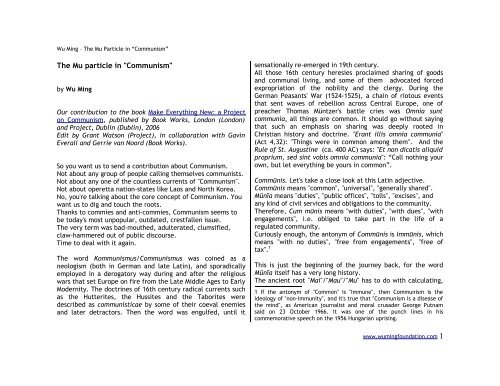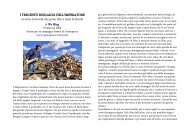The Mu particle in "Communism" - Wu Ming
The Mu particle in "Communism" - Wu Ming
The Mu particle in "Communism" - Wu Ming
Create successful ePaper yourself
Turn your PDF publications into a flip-book with our unique Google optimized e-Paper software.
<strong>Wu</strong> M<strong>in</strong>g – <strong>The</strong> <strong>Mu</strong> Particle <strong>in</strong> “Communism”<br />
<strong>The</strong> <strong>Mu</strong> <strong>particle</strong> <strong>in</strong> "Communism"<br />
by <strong>Wu</strong> M<strong>in</strong>g<br />
Our contribution to the book Make Everyth<strong>in</strong>g New: a Project<br />
on Communism, published by Book Works, London (London)<br />
and Project, Dubl<strong>in</strong> (Dubl<strong>in</strong>), 2006<br />
Edit by Grant Watson (Project), <strong>in</strong> collaboration with Gav<strong>in</strong><br />
Everall and Gerrie van Noord (Book Works).<br />
So you want us to send a contribution about Communism.<br />
Not about any group of people call<strong>in</strong>g themselves communists.<br />
Not about any one of the countless currents of "Communism".<br />
Not about operetta nation-states like Laos and North Korea.<br />
No, you're talk<strong>in</strong>g about the core concept of Communism. You<br />
want us to dig and touch the roots.<br />
Thanks to commies and anti-commies, Communism seems to<br />
be today's most unpopular, outdated, crestfallen issue.<br />
<strong>The</strong> very term was bad-mouthed, adulterated, clumsified,<br />
claw-hammered out of public discourse.<br />
Time to deal with it aga<strong>in</strong>.<br />
<strong>The</strong> word Kommunismus/Communismus was co<strong>in</strong>ed as a<br />
neologism (both <strong>in</strong> German and late Lat<strong>in</strong>), and sporadically<br />
employed <strong>in</strong> a derogatory way dur<strong>in</strong>g and after the religious<br />
wars that set Europe on fire from the Late Middle Ages to Early<br />
Modernity. <strong>The</strong> doctr<strong>in</strong>es of 16th century radical currents such<br />
as the Hutterites, the Hussites and the Taborites were<br />
described as communisticae by some of their coeval enemies<br />
and later detractors. <strong>The</strong>n the word was engulfed, until it<br />
sensationally re-emerged <strong>in</strong> 19th century.<br />
All those 16th century heresies proclaimed shar<strong>in</strong>g of goods<br />
and communal liv<strong>in</strong>g, and some of them advocated forced<br />
expropriation of the nobility and the clergy. Dur<strong>in</strong>g the<br />
German Peasants' War (1524-1525), a cha<strong>in</strong> of riotous events<br />
that sent waves of rebellion across Central Europe, one of<br />
preacher Thomas Müntzer's battle cries was Omnia sunt<br />
communia, all th<strong>in</strong>gs are common. It should go without say<strong>in</strong>g<br />
that such an emphasis on shar<strong>in</strong>g was deeply rooted <strong>in</strong><br />
Christian history and doctr<strong>in</strong>e. "Erant illis omnia communia"<br />
(Act 4,32): "Th<strong>in</strong>gs were <strong>in</strong> common among them". And the<br />
Rule of St. August<strong>in</strong>e (ca. 400 AC) says: "Et non dicatis aliquid<br />
proprium, sed s<strong>in</strong>t vobis omnia communia": “Call noth<strong>in</strong>g your<br />
own, but let everyth<strong>in</strong>g be yours <strong>in</strong> common”.<br />
Commūnis. Let's take a close look at this Lat<strong>in</strong> adjective.<br />
Commūnis means "common", "universal", "generally shared".<br />
Mūnĭa means "duties", "public offices", "tolls", "excises", and<br />
any k<strong>in</strong>d of civil services and obligations to the community.<br />
<strong>The</strong>refore, Cum mūnis means "with duties", "with dues", "with<br />
engagements", i.e. obliged to take part <strong>in</strong> the life of a<br />
regulated community.<br />
Curiously enough, the antonym of Commūnis is Immūnis, which<br />
means "with no duties", "free from engagements", "free of<br />
tax". 1<br />
This is just the beg<strong>in</strong>n<strong>in</strong>g of the journey back, for the word<br />
Mūnĭa itself has a very long history.<br />
<strong>The</strong> ancient root "Mai"/"Mau"/"<strong>Mu</strong>" has to do with calculat<strong>in</strong>g,<br />
1 If the antonym of "Common" is "Immune", then Communism is the<br />
ideology of "non-immunity", and it's true that "Communism is a disease of<br />
the m<strong>in</strong>d", as American journalist and moral crusader George Putnam<br />
said on 23 October 1966. It was one of the punch l<strong>in</strong>es <strong>in</strong> his<br />
commemorative speech on the 1956 Hungarian upris<strong>in</strong>g.<br />
www.wum<strong>in</strong>gfoundation.com 1
<strong>Wu</strong> M<strong>in</strong>g – <strong>The</strong> <strong>Mu</strong> Particle <strong>in</strong> “Communism”<br />
weigh<strong>in</strong>g, measur<strong>in</strong>g th<strong>in</strong>gs - presumably <strong>in</strong> order to exchange<br />
them equitably or distribute them between your fellow<br />
persons.<br />
That's what supposed to happen with duties <strong>in</strong> a fairly<br />
regulated community.<br />
We can f<strong>in</strong>d this correspondence <strong>in</strong> several ancient languages.<br />
In Vedic Sanskrit, the 4000-year-old sacred language of India,<br />
Mâti means "to measure".<br />
In Lat<strong>in</strong>, Mensio means "measure" (French: Mesure; Italian:<br />
Misura).<br />
In Old Slavonic (the first literary Slavic language, developed <strong>in</strong><br />
the 9th century) Mena means "exchange", "barter".<br />
In Old Lithuanian (15th century), Maínas has the same<br />
mean<strong>in</strong>g.<br />
In Germanic languages, there was a dist<strong>in</strong>ct but parallel<br />
term<strong>in</strong>ological evolution: the German adjective Geme<strong>in</strong>as<br />
perfectly reflects Commūnis. Ge-me<strong>in</strong>as = Cum-mūnis. 2<br />
That's also where the English words Moon (Greek: Mhnh;<br />
2 By the way, Geme<strong>in</strong>wesen ("community", "common essence",<br />
"communal be<strong>in</strong>g") was one of Karl Marx's favourite words, as well as one<br />
of the key concepts <strong>in</strong> his early texts, e.g. the "Critical Notes on the<br />
Article '<strong>The</strong> K<strong>in</strong>g of Prussia and Social Reform. By a Prussian'." (1844):<br />
"But do not all rebellions without exception have their roots <strong>in</strong> the<br />
disasterous isolation of man from the geme<strong>in</strong>wesen? Does not every<br />
rebellion necessarily presuppose isolation? Would the revolution of 1789<br />
have taken place if French citizens had not felt disasterously isolated<br />
from the geme<strong>in</strong>wesen? <strong>The</strong> abolition of this isolation was its very<br />
purpose. But the geme<strong>in</strong>wesen from which the workers is isolated is a<br />
geme<strong>in</strong>wesen of quite different reality and scope than the political<br />
geme<strong>in</strong>wesen. <strong>The</strong> geme<strong>in</strong>wesen from which his own labor separates him<br />
is life itself, physical and spiritual life, human morality, human activity,<br />
human enjoyment, human nature.". As regards the development of this<br />
concept <strong>in</strong> 20th century critical post-Marxism, see the works of French<br />
th<strong>in</strong>ker Jacques Camatte.<br />
Gothic 3 : Mēna; Old English 4 : Mōna) and Month (Greek: Mhn,<br />
Lat<strong>in</strong>: Mensis) come from. <strong>The</strong> moon was used <strong>in</strong> order to<br />
count days and measure longer periods of time.<br />
That's also where M<strong>in</strong>d (Lat<strong>in</strong>: Mens) comes from. <strong>The</strong> m<strong>in</strong>d is<br />
the organ that counts/measures/weighs and then sets the<br />
value and the mean<strong>in</strong>g of th<strong>in</strong>gs. Of course, the word Mean<strong>in</strong>g<br />
has the same orig<strong>in</strong>s.<br />
Most important, the Akkadian word Manû means "to count on<br />
the f<strong>in</strong>gers". 5<br />
Akkadian is an ancient Semitic language. It was already widely<br />
spoken (and written <strong>in</strong> cuneiform) <strong>in</strong> Mesopotamia 4,500 years<br />
ago. It was the language of that era's “<strong>in</strong>ternational”<br />
commerce. Plenty of <strong>in</strong>scriptions and tablets have been found<br />
all over Asia M<strong>in</strong>or.<br />
<strong>The</strong> most prestigious and controversial Italian l<strong>in</strong>guist and<br />
philologist, the late Giovanni Semerano (1913-2005), devoted<br />
his entire life to trac<strong>in</strong>g the orig<strong>in</strong>s of all European languages<br />
back to Akkadian and a common Semitic base. He filled almost<br />
all the gaps <strong>in</strong> the etymology of Greek and Lat<strong>in</strong> terms. We're<br />
draw<strong>in</strong>g heavily from his works and discoveries. 6<br />
3 Gothic was the Germanic language spoken by the Goths (2nd-5th<br />
Century). <strong>The</strong>y later split <strong>in</strong>to two different tribes, Ostrogoths and<br />
Visigoths, and practically took over the dy<strong>in</strong>g Roman Empire <strong>in</strong> Southern<br />
Europe.<br />
4 By "Old English" (also called "Anglo-Saxon") l<strong>in</strong>guists mean the Germanic<br />
language spoken <strong>in</strong> England before the 1066 Norman <strong>in</strong>vasion.<br />
5 It's the only reasonable etymological explanation of the Lat<strong>in</strong> word<br />
Manus, "hand". Italian and Spanish: Mano; Portuguese: Mão; French:<br />
Ma<strong>in</strong>; Catalan: Mà.<br />
6 Semerano's f<strong>in</strong>d<strong>in</strong>gs were systematized <strong>in</strong> his immense work Le orig<strong>in</strong>i<br />
della cultura europea [<strong>The</strong> Orig<strong>in</strong>s of European Culture] which was<br />
published <strong>in</strong> two 2-volume <strong>in</strong>stalments whose subtitles are Rivelazioni<br />
della l<strong>in</strong>guistica storica [Revelations from Historical L<strong>in</strong>guistics] (Olschki,<br />
www.wum<strong>in</strong>gfoundation.com 2
<strong>Wu</strong> M<strong>in</strong>g – <strong>The</strong> <strong>Mu</strong> Particle <strong>in</strong> “Communism”<br />
Let's go further back now.<br />
What is the reason the root "Mai"/ "Mau"/"<strong>Mu</strong>" has to do with<br />
measur<strong>in</strong>g and shar<strong>in</strong>g?<br />
<strong>The</strong> Akkadian term for "water" is Mû. Ugaritic 7 : Mj. Aramaic 8 :<br />
Majjā.<br />
Water is the most valuable resource, you can barter anyth<strong>in</strong>g<br />
for it if you're thirsty. Water is the ma<strong>in</strong>stay of any<br />
community, the first th<strong>in</strong>g that must be shared equally. <strong>The</strong><br />
necessity of distribut<strong>in</strong>g and shar<strong>in</strong>g water is the pre-condition<br />
and basis of all economy and social regulation.<br />
We're s<strong>in</strong>k<strong>in</strong>g deep <strong>in</strong>to the past, speculat<strong>in</strong>g on the very birth<br />
of human language.<br />
<strong>The</strong>re's a strict correspondence between the consonant "M" and<br />
water. <strong>The</strong> sound "M" is roughly onomatopoeic of dr<strong>in</strong>k<strong>in</strong>g. If<br />
you're thirsty and get to dr<strong>in</strong>k avidly, you emit a deep, low<br />
Florence 1984, ISBN 8822232542) and Basi semitiche delle l<strong>in</strong>gue <strong>in</strong>doeuropee<br />
[<strong>The</strong> Semitic Foundations of Indo-European Languages] (Olschki,<br />
Florence 1994, ISBN 8822242335). In the follow<strong>in</strong>g decade, he<br />
"popularized" his theories <strong>in</strong> shorter books, and published further<br />
groundbreak<strong>in</strong>g studies on the Etruscan language. His latest works<br />
<strong>in</strong>clude La favola dell'<strong>in</strong>doeuropeo [<strong>The</strong> Myth of the Indo-European<br />
Language] (B. Mondadori, Milan 2005, ISBN 8842492744) and Il popolo che<br />
sconfisse la morte: Gli Etruschi e la loro l<strong>in</strong>gua [<strong>The</strong> People that<br />
Defeated Death: <strong>The</strong> Etruscans and their Language] (B. Mondadori, Milan<br />
2006, ISBN 8842490709). As far as we know, there is no English<br />
translation of his books.<br />
7 Ugaritic was a Semitic language spoken <strong>in</strong> Syria from the 14th through<br />
the 12th century BC.<br />
8 Aramaic is another Semitic language, very close to Hebrew, and Jesus<br />
of Nazareth's mother tongue, as it was the everyday language spoken by<br />
Jews <strong>in</strong> Palest<strong>in</strong>a at the times the region was part of the Roman empire.<br />
Aramaic and its dialects are still spoken <strong>in</strong> some parts of the Middle East<br />
(especially Syria). Some books of the Bible were orig<strong>in</strong>ally written <strong>in</strong><br />
Aramaic (e.g. the book of Daniel).<br />
sound that can be rendered as "Oom... Oom... Oom..."<br />
In Italian baby-speak, the word for "water" is Bumba<br />
(pronounced "Boom-bah").<br />
F<strong>in</strong>ally, we can say that the "-mu(n)" <strong>particle</strong> conta<strong>in</strong>ed <strong>in</strong> the<br />
word "Com-mun-ism" has to do with water. Which has now<br />
become the scarcest of resources.<br />
If the word were refreshed, recharged, revamped, its return to<br />
use couldn't be better timed.<br />
This essay is licensed under a Creative Common<br />
License. You are free to copy, distribute, display, and<br />
perform the work. You are also free to make derivative<br />
works, under the follow<strong>in</strong>g commandments: thou shalt give the orig<strong>in</strong>al<br />
author credit; thou shalt not use this work for commercial purposes; If<br />
thou alter, transform, or build upon a text, thou shalt distribute the<br />
result<strong>in</strong>g work only under a license identical to this one.<br />
www.wum<strong>in</strong>gfoundation.com 3















